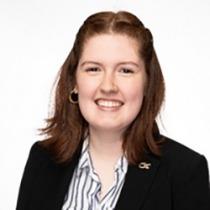
Emily V Hale
What is your next adventure?
I'm going to begin a two-year rotational assignment with Raytheon Technologies, as a part of their Margaret Ingels Engineering Development Program. I don't have a location, yet, but I'm excited about the options that I'll have. The original plan was to be in a new city, but, I may need to start remotely, doing my work from the very same desk where I am now studying for classes.
What about your next adventure are you most looking forward to?
I very much enjoyed the interview process for the position at Raytheon, because they really expected you to speak up and identify your strengths. Now, I am even more excited about the development opportunities that are ahead. Over the next two years, I will be put in four different roles, each of them in completely different business units, so I'll get a much wider view of the aerospace industry. Once I was selected, too, I got a call from Professor [J. P.] Clarke, who has been working as a vice president there. He wanted to speak with all of us [Ingels fellows] about our career paths, and our futures. Getting to talk with someone so senior in the field, to get advice from them, is really exciting. I know that the company has an employee scholar program, which could pay for my master's.
Did you have any previous co-op, internship, or research experience in this area?
For two years I was involved in a wide range of research activities in the Experimental Aerodynamics Group with Professor Komerath. We did lots of different projects that involved the wind tunnel. I also contributed to a paper, helping with the editing. That introduced me to a very different aspect of the field. My entire fourth year was spent in the UK at Airbus, where I was an air worthiness intern. My job was to make sure things were certified by the Air Worthiness Authorities. It required broad technical understanding of the system so that I could communicate accurately with the chief engineer, the stress experts, and the design team on changes that were indicated. My team was one of the last steps in the review process. We had to check the regulations, and make sure all of the experts had signed off.
How did your educational experience at Georgia Tech help you to achieve your goals?
More than just a knowledge of aerospace engineering, what I've gained from my time at Tech is that, if you really want to understand a subject, you need to be willing to ask lots of questions. And to do that, you need to work well with a lot of different people, so you need to adapt your approach to fit the situation you are in. So, recognizing this, I've had some great experiences at Tech -- from mentoring first-year students to being on the committee that interviewed the incoming Chair of the AE School.
What advice would you give to an underclassman who would like to follow the same path?
My advice is to give whatever you are doing 100 percent of your attention and energy. What you choose doesn't matter as much as having the ability to give 100 percent. If that's a Design-Build-Fly competition or a Robojacket competition, great.
For me, outside of classes, my goal was to improve the campus's handling of mental health issues. The thing I'm really proud about is real but not tangible: Georgia Tech is a different place, now, when it comes to mental health. The first year I was here, no one spoke about it except a small group of activists.
But if you look at some of the messaging that's been coming out since COVID-19 hit, you'll see a consistent part of the conversation has been mental health. That's a success that matters. This has been a time when a lot of us have really struggled because you have a pandemic that has an unknown end that's making lots of unknown changes to the future. And we've been told to isolate, so we don't go home to our friends.
What we've learned to tell ourselves is to be the best version of ourselves, every day, and to do what we can to have more capacity the next day. I've learned to do the best I can every day, and to not ask myself to do more than that. And what makes me see progress is the number of people who've thought to tell me, during this COVID shutdown: 'I'm here for you. We're here for each other.' That tells me we're making progress.